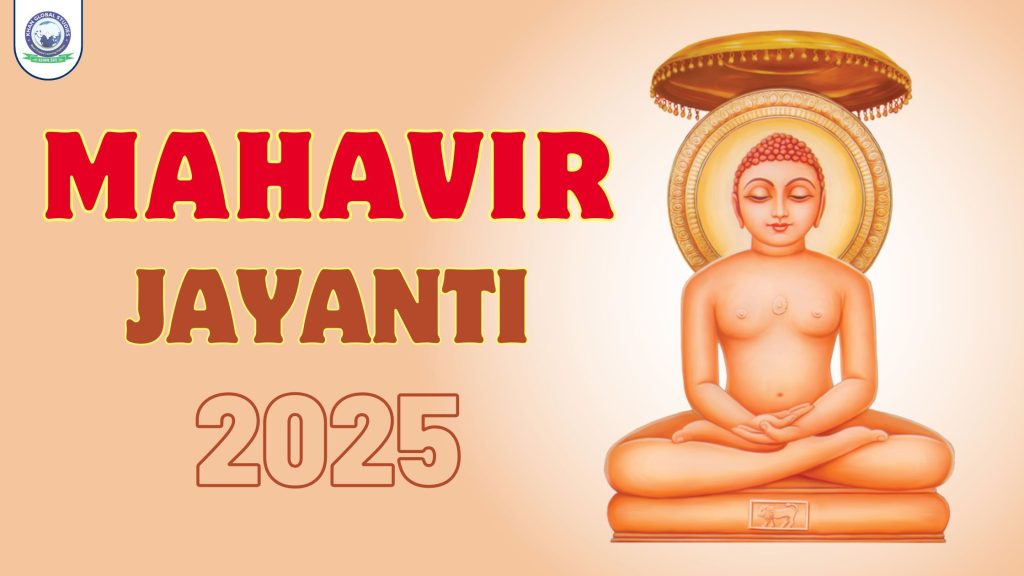Mahavir Jayanti is celebrated as the birth anniversary of Lord Mahavir, the 24th Tirthankara of Jainism. It is one of the most significant festivals for the Jain community and is observed with great enthusiasm across India. Lord Mahavir preached the principles of non-violence (Ahimsa), truth (Satya), non-possessiveness (Aparigraha), celibacy (Brahmacharya), and non-stealing (Asteya), which continue to inspire humanity even today.
Life of Lord Mahavir
- Birth and Early Life: Lord Mahavir was born in 599 BCE on Chaitra Shukla Trayodashi in Kundalgram (Vaishali, Bihar). His birth name was Vardhaman, and he was the son of King Siddhartha and Queen Trishala. Raised in a royal environment, he displayed a strong inclination towards spirituality from a young age.
- Renunciation: At the age of 30, Vardhaman renounced worldly life and adopted asceticism. For twelve years, he practiced intense penance and meditation, enduring severe hardships while remaining steadfast in his path of non-violence and patience.
- Attainment of Kevala Jnana (Supreme Knowledge): After twelve years of rigorous spiritual practices, Lord Mahavir attained enlightenment on the banks of the Rijupalika River. He then became a Kevalin (omniscient being) and dedicated his life to spreading the principles of Jainism.
- Nirvana (Liberation): At the age of 72, Lord Mahavir attained Nirvana (liberation) in Pawapuri, Bihar, on Kartik Krishna Amavasya. This day is observed as Diwali, marking his departure from the physical world.
Key Teachings of Lord Mahavir
Lord Mahavir emphasized the five fundamental principles of Jainism, which form the foundation of spiritual and ethical life.
- Non-Violence (Ahimsa Parmo Dharma)
The most profound teaching of Lord Mahavir was Ahimsa (non-violence). He preached that no living being should be harmed physically or mentally. According to him, every soul is sacred, and one must show compassion toward all creatures.
- Truth (Truth is God)
Lord Mahavir taught that adhering to truth is the highest form of devotion. Lying not only deceives others but also misleads oneself.
- Non-Possessiveness (Detachment from Material Things)
He emphasized the renunciation of material possessions. According to him, human desires and attachments lead to suffering, and one should practice self-restraint.
- Celibacy (Control of the Senses)
Brahmacharya refers to self-discipline in thoughts, speech, and actions. Lord Mahavir considered this an essential path to self-purification and enlightenment.
- Non-Stealing (Asteya – Not Taking What Does Not Belong to You)
He taught that one should never take anything that belongs to someone else. Taking another’s property without permission is equivalent to theft.
Significance and Celebration of Mahavir Jayanti
- Date and Timing: Mahavir Jayanti is celebrated every year on Chaitra Shukla Trayodashi as per the Hindu calendar. It marks the birth anniversary of Lord Mahavir and is observed with devotion and reverence by the Jain community.
- Rituals and Worship: On this day, special prayers and rituals are performed in Jain temples. The idol of Lord Mahavir is bathed and adorned, followed by the recitation of his teachings. Devotees participate in prabhat pheris (morning processions) to spread his messages.
- Charity and Social Service: On Mahavir Jayanti, acts of charity and service are undertaken by the Jain community. Donations of food, clothing, and medicines are made to the needy. Awareness programs promoting non-violence and vegetarianism are organized.
- Peaceful Processions and Discourses: Devotees hold peaceful processions, spreading Lord Mahavir’s messages. Religious discourses emphasize the importance of compassion, truth, and non-violence in daily life.
Relevance of Lord Mahavir’s Teachings in Modern Society
In today’s world, Lord Mahavir’s teachings are more relevant than ever. In an era plagued by violence, greed, and dishonesty, his principles serve as a guiding light for humanity. By following non-violence and truthfulness, we can create a harmonious and just society. His teachings encourage self-discipline, coexistence, and empathy towards all living beings.
Conclusion
Mahavir Jayanti is not just a festival; it is an opportunity to imbibe Lord Mahavir’s ideals in our lives. He inspired us to walk the path of love, compassion, non-violence, and truth. If we incorporate his teachings, the world will become a more peaceful and prosperous place. His principles are not just meant for the Jain community but serve as an eternal source of inspiration for all of humanity.




